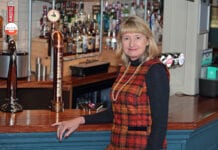Hawthorn Leisure boss unveils ambitious growth plans

By Gillian McKenzie
WHILE the economic climate and ongoing uncertainty surrounding Brexit might have prompted some companies to tighten the purse strings and even put the brakes on expansion plans, one UK pub group is pressing ahead with ambitious investment plans – with a particular focus on Scotland.
Hawthorn Leisure, which has 306 tenanted and managed pubs across the UK – 106 of which are in Scotland, plans to invest over £3 million in its estate this year, around £1.5m of which has been earmarked for 40 of its Scottish outlets.
We’re committed to Scotland; it’s a big focus for us going forward.
The company’s Glasgow-born chief executive Gerry Carroll, who cut his teeth with a part-time bar job in Glasgow when he was a student before moving south to work for major players such as Whitbread and Mitchells & Butlers, concedes it’s a major commitment; but he said the company’s strategy of acquisition and investment is paying dividends.
“In 2018 we’ll spend £3m to £3.5m – and almost half of that in Scotland,” he said.
“A third of our estate is in Scotland and we’ll spend half our capex here; it will be our biggest capital investment in Scotland.
“Scotland is a big focus for us; we’re looking to touch 40 pubs with that spend.”
This year’s investment will build on the £13.5m Hawthorn has invested in its UK pubs estate since the company’s inception in 2014.
For Carroll, setting up Hawthorn Leisure, which he did with backing from Avenue Capital and the acquisition of 275 pubs from Greene King, was the realisation of a long-held ambition.
Having started out in the trade with a part-time job at the then Crown Bar on Duke Street in Glasgow’s east end, he went on to work for national groups like Whitbread, Mitchells & Butlers, Permira (which owned Travelodge and Little Chef at the time) and, laterally, Enterprise Inns, for whom he ran an estate of around 3500 pubs (including some Scottish outlets which he would ultimately go on to buy under Hawthorn).
Keen to branch out on his own, Carroll laid the foundations of Hawthorn Leisure in 2014, adding to the initial acquisition with a further 88 outlets from the former pub portfolio of Robert Tchenguiz.
Since then, he said the company has been “slightly under the radar, working away quietly to build up the business”, having nailed its colours firmly to the mast from the get-go with community pubs accounting for the majority of the estate.
And, as Hawthorn continues on the acquisition trail, with an ultimate target of between 1000 and 2000 pubs across the UK, it’s a focus that isn’t likely to change any time soon.
While Carroll concedes that the pubs sector remains under pressure, he reckons there are plenty of opportunities.
“The strongest are surviving – those with the best operations, a proposition that meets their customers’ needs, who are investing and keeping standards up – they are the ones that are doing well,” he said.
“This (Queens Park Café on Glasgow’s Victoria Road) is an iconic pub which we invested in to take it back to its original glory; and we kept it wet-led – we could have taken out part of the seating area at the back and put in a kitchen but we stuck to our roots here.
We want to buy more community pubs – that’s our bag.
“We’ve got a lot of pubs that are wet only. I think you can complicate some businesses and put a lot of cost in by doing food.
“We’ve built the company by repositioning pubs and investing in them; and we’re on the lookout for more.
“We’re in a position that we could easily double in size – we’ve got the infrastructure in place. And we’re looking for more community pubs – that’s our bag.”
The ambitious expansion plans follow three consecutive years of growth for the company – success Carroll attributes to Hawthorn’s “different approach”.
It operates four models: tenanted and leased; operator managed; fully managed; and free of tie (of its 106 pubs in Scotland, ten are fully or operator managed and 96 are tenanted and leasehold, of which 16 are free of tie).
Carroll said the company prides itself in the flexibility it can offer operators.
“We’re outperforming the market but I think that’s down to supporting our partners, whether managed or tenanted,” he said.
“We’re listening to them and coming up with individual business plans that work for both sides.
“It’s about trying to think differently – just because someone has run a pub one way doesn’t mean that we would.
“We’ve grown the business strongly in Scotland. It’s been a great journey so far and we’re just at the start of it.
“It’s a big deal, how much we’re going to invest this year.
“We’re committed to Scotland and we’re putting our money where our mouth is.”























